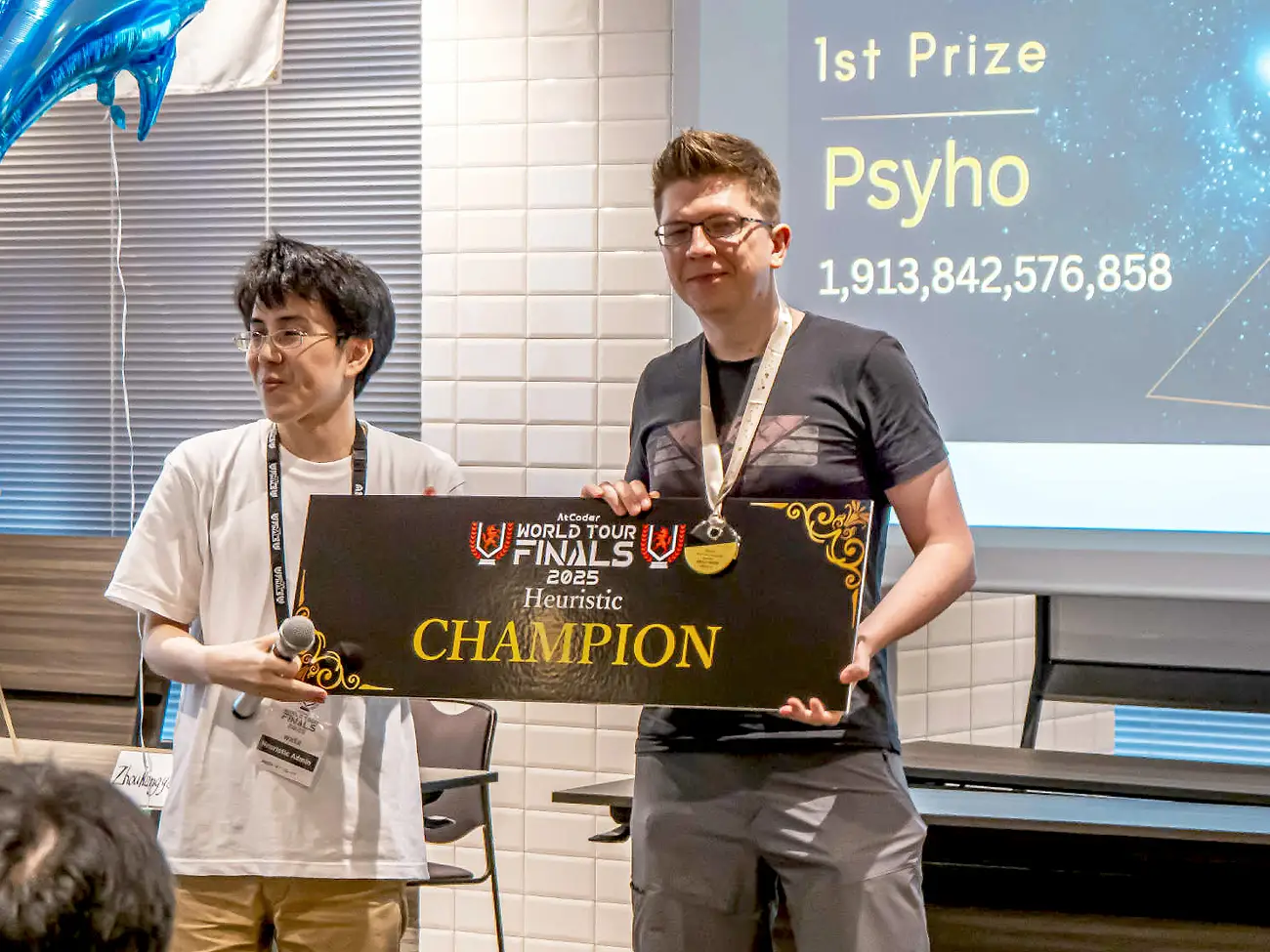Human programmer beats OpenAI's custom AI in 10-hour marathon, wins World Coding Championship — Polish programmer might be the last human winner
Still got it.

Przemysław “Psyho” Dębiak, a 42-year-old programmer from Gdynia, Poland, made history by defeating OpenAI’s custom AI model at the AtCoder World Tour Finals (AWTF) 2025 "Humans vs AI" contest in Tokyo. Considered one of the most prestigious coding tournaments in the world, the AWTF invites just 12 of the top-ranked human programmers—and, for the first time, an AI competitor—to tackle its grueling challenges. After a 10-hour coding marathon, Dębiak edged out the AI by roughly 9.5%, clinching first place while the OpenAI-built model settled for second.
“Humanity has prevailed (for now)!” Dębiak wrote on X, confessing he’d slept only around 10 hours over three days while pushing himself to the limit. OpenAI CEO Sam Altman aptly responded with, “Good job, Psyho.” The AI model, branded OpenAIAHC, was widely expected to dominate the market. Still, Dębiak’s innovative, heuristic-driven approach—using problem-solving shortcuts and educated guesses instead of brute-force calculation—secured the win. Contest administrator Yoichi Iwata praised his distinctive method, noting that while the AI excelled at raw optimization, it “fell short of human creativity.”
Humanity has prevailed (for now!)I'm completely exhausted. I figured, I had 10h of sleep in the last 3 days and I'm barely alive.I'll post more about the contest when I get some rest. (To be clear, those are provisional results, but my lead should be big enough) pic.twitter.com/fIMo0ifNCdJuly 16, 2025
The AtCoder World Tour Finals (AWTF) is regarded as the ultimate stage for heuristic programming contests that focus on “good-enough” solutions to complex, unsolvable problems rather than perfect ones. This year’s challenge tasked competitors with plotting a robot’s path across a 30×30 grid using the fewest possible moves, an NP-hard optimization problem with countless possible outcomes. With no access to external libraries or documentation, success relied on intuition, creativity, and adaptability—qualities where human ingenuity can still outthink the raw speed and precision of AI models.
Dębiak, a former OpenAI engineer who helped develop OpenAI Five (the Dota 2 AI), competed using only Visual Studio Code with basic autocomplete and admitted the AI pushed him to his limits: “I was close to the model’s score, and that pushed me to give everything.” Near the end of the 10-hour marathon, he overtook OpenAIAHC to claim victory and a 500,000 yen prize. A veteran algorithmic competitor, Mensa member, and four-time TopCoder Open Marathon champion, Dębiak has never held a full-time job and once even joked about considering careers from DJing to professional poker. His win carries symbolic weight, a human triumphing over AI in a field where machines typically excel.
Update: I'm alive and wellThe results are official now and my lead over AI increased from 5.5% to 9.5%😎Honestly, the hype feels kind of bizarre. Never expected so many people would be interested in programming contests. Guess this means I should drop in here more often👀 pic.twitter.com/RsLD8lECNqJuly 17, 2025
All that being said, AI’s steady progress is undeniable—Stanford’s 2025 AI Index found coding benchmarks jumped from 4.4% AI success in 2023 to 71.7% in 2024. With tools like GitHub Copilot used daily by over 90% of developers, AI is reshaping workflows. However, this win highlights that creativity, endurance, and intuition —especially in long-form heuristic challenges —remain human strengths.
Dębiak isn’t naive about the challenge ahead, saying, “It’s easy to imagine a different problem where AI would win and humans would be far behind.”. Still, this feels like a human John Henry moment—a testament not just to sheer human will, but to the spark of creativity machines haven’t replicated and (hopefully) will never be able to.
Follow Tom's Hardware on Google News to get our up-to-date news, analysis, and reviews in your feeds. Make sure to click the Follow button.
Get Tom's Hardware's best news and in-depth reviews, straight to your inbox.

Hassam Nasir is a die-hard hardware enthusiast with years of experience as a tech editor and writer, focusing on detailed CPU comparisons and general hardware news. When he’s not working, you’ll find him bending tubes for his ever-evolving custom water-loop gaming rig or benchmarking the latest CPUs and GPUs just for fun.
-
bit_user Counting down the number of things humans still do better is not a good place to be. I'm surprised the AI came so close on this one.Reply
From what I've heard, it's still not good at large-scale software engineering tasks, but that day might not be far off.
The other thought have is that I don't know how good AI would be at debugging, or how easy a human would find it to try and debug AI-written code or an AI-designed system. I think this will probably keep human programmers employed for a while, yet. -
Alvar "Miles" Udell ReplyWith no access to external libraries or documentation, success relied on intuition, creativity, and adaptability—qualities where human ingenuity can still outthink the raw speed and precision of AI models.
A LLM does not have Intuition, emotions, creativity, or even adaptability that's not programmed into them or accessible to them, so of course with these restraints it's going to lose. You can try it out yourself by using something like LM Studio which doesn't allow LLMs to access outside resources. -
bit_user Reply
In a sense, what it's doing is channeling the intuition and creativity of the authors of its training data. It's applying heuristics it learned, not so unlike a human would.Alvar Miles Udell said:A LLM does not have Intuition, emotions, creativity, or even adaptability that's not programmed into them or accessible to them,
"of course"? The human, who is clearly one of the most skilled programmers at these sorts of challenges, won by only a rather close margin! Furthermore, it sounded like he really pulled out all the stops to give such a performance!Alvar Miles Udell said:so of course with these restraints it's going to lose.
Also, the AI beat the next 11 best human competitors. So, it's not like this human was having a bad day, to have delivered such a narrow victory.
You should use a LLM that's suited to the task - ideally what they entered in this competition, if that's what you're trying to do with it.Alvar Miles Udell said:You can try it out yourself by using something like LM Studio which doesn't allow LLMs to access outside resources. -
Elusive Ruse Well done to the human programmer! 😎Reply
On another note I’m surprised the the OpenAI model came so close; according to the resident experts here AI sucks at coding. -
bit_user Reply
Again, depends on what model you're talking about.Elusive Ruse said:according to the resident experts here AI sucks at coding.
In general, what I think it tends to do best is solving well-specified, self-contained problems. Probably, a lot of its training set was comprised of programming contest problems and solutions, like these. -
acadia11 Reply
Soon the creation will be the creator.Admin said:Przemysław “Psyho” Dębiak, a Polish programmer and former OpenAI engineer, defeated the company’s own advanced AI model in the 2025 AtCoder World Tour Finals. In a grueling 10-hour coding contest, he outscored the AI by 9.5%, proving human ingenuity still has an edge, at least for now.
Polish programmer beats OpenAI's custom AI in 10-hour marathon, wins World Coding Championship — possibly the last human winner : Read more -
Makaveli Reply
I will be very curious to see what this competition looks like in 2030.bit_user said:Again, depends on what model you're talking about.
In general, what I think it tends to do best is solving well-specified, self-contained problems. Probably, a lot of its training set was comprised of programming contest problems and solutions, like these. -
bit_user Reply
LOL, it'll be AI models competing against each other!Makaveli said:I will be very curious to see what this competition looks like in 2030.
: D -
mwhannan74 Okay, so this is both impressive for the AI and not at all the same time. This was not even close to a fair competition. The human was not allowed access to the internet or any existing libraries and had to figure everything out from scratch. However, a massive AI model that has effectively memorized the entire internet, runs on 100's of GPUs and CPUs, and needs a small power plant to run its model was his competition. Not what I would say is apples to apples comparison.Reply
A real comparison would have been:
Option #1 - Run the AI model locally on a single server.
Option #2 - Allow the human access to the internet and a bunch of his programming buddies.
I guarantee he would have crushed the AI in a fraction of the time.
This is almost as bad as the guy who says that AI sucks at chess compared to an Atari when he pretty much stacked the deck against the AI in every way.
Without thinking too much about it and knowing the exact problem, path planning for a robot with the least amount of moves is a common and very old problem that can easily be solved by A*, Dikstra's, and several other algorithms. So, not sure what this challenge actually is and why it took so much time and a Billion dollar computer to solve it. 🤷♂️ -
Arkitekt78 Reply
Precisely why AI can only write code, not software. No intuition, no creativity, no ACTUAL intelligence. This doesn't surprise me at all.Admin said:Przemysław “Psyho” Dębiak, a Polish programmer and former OpenAI engineer, defeated the company’s own advanced AI model in the 2025 AtCoder World Tour Finals. In a grueling 10-hour coding contest, he outscored the AI by 9.5%, proving human ingenuity still has an edge, at least for now.
Polish programmer beats OpenAI's custom AI in 10-hour marathon, wins World Coding Championship — possibly the last human winner : Read more